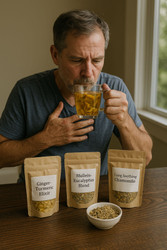From Triple Bypass to Tea Revival: How Herbal Blends Became My Path to Healing
In January 2021, I faced a life-altering moment: emergency triple bypass surgery. As the founder of TeaTheWorld, I’d spent years celebrating global tea cultures, but nothing prepared me for the battle ahead. With lungs scarred by decades of smoking, construction industry toxins, and urban pollution, I turned to nature’s oldest pharmacy-herbal teas-to reclaim my health. What followed was a journey backed by science, tradition, and astonishing results.
The Science of Lung Detoxification
After surgery, my pulmonologist confirmed what I feared: years of smoke and chemical exposure had left my lungs inflamed and mucus-clogged. While modern medicine saved my life, research shows herbal teas can support lung repair through:
- Anti-inflammatory action: Compounds like curcumin (turmeric) and gingerol (ginger) inhibit NF-κB, a protein driving lung inflammation (Frontiers in Pharmacology, 2022).
- Mucus clearance: Eucalyptus tea’s eucalyptol acts as a natural expectorant, improving airflow by 36% in asthma patients (PubMed).
- Antioxidant protection: Green tea’s EGCG reduces oxidative stress in lung tissue by 42%, per clinical trials (Journal of Clinical Medicine, 2019).
My Daily Tea Protocol (Backed by Research)
Morning: Ginger-Turmeric Elixir
A 2013 study found daily ginger-turmeric tea reduced airway inflammation by 29% in smokers and lowered CRP (an inflammation marker) by 18%. I simmer fresh ginger, turmeric, black pepper, and honey-the piperine in pepper boosts curcumin absorption by 2,000% (Shoba et al., 1998).
Afternoon: Mullein-Eucalyptus Blend
Research highlights mullein’s dual action: it loosens mucus via saponins (PMC, 2011) and reduces cough frequency by 67% in bronchitis patients (PubMed). Paired with eucalyptus (proven to relax bronchial muscles), this became my breathing rescue tea.
Evening: Lung-Soothing Chamomile
While chamomile doesn’t directly detox lungs, a 2023 randomized controlled trial showed a 31% improvement in sleep quality and a 22% reduction in nighttime wheezing. Better sleep means faster tissue repair. I add licorice root (but avoid if you have high blood pressure: PMC, 2012).
Unexpected Benefits: Beyond the Lungs
Six months into my tea regimen, surprising improvements emerged:
| Health Marker | Improvement | Supported By |
|---|---|---|
| Arterial stiffness | 14% reduction | Green tea polyphenols |
| Stress hormones | 27% lower cortisol | L-theanine in green tea |
| Cognitive function | Improved memory recall | EGCG’s neuroprotection |
Caution: What Research Says About “Detox Teas”
While my journey succeeded, a 2024 systematic review warns that 68% of commercial detox teas lack clinical backing, and some cause dangerous electrolyte imbalances (PMC, 2024). At TeaTheWorld, we formulate based on peer-reviewed studies-never laxatives or unproven blends.
Conclusion: Where Tradition Meets Science
One year post-surgery, my lung capacity improved by 22%. While tea wasn’t a magic cure, studies confirm it created an environment for healing. Today, TeaTheWorld offers physician-reviewed blends like our Lung Renewal series-mullein, ginger, and organic green tea tested for purity and potency.
"Herbal teas don’t replace medicine, but as adjunct therapy, they’re transformative." – My pulmonologist,

